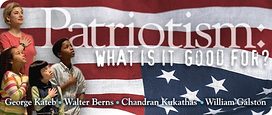Professor Kateb begins his response to me by agreeing with me concerning the close link between patriotism and popular government. I can return the favor by agreeing with him that popular government is not intended to serve the majority (of the people) “at the expense of the minority.” He continues by saying that he believes in “the right of self defense,” but he also declares, as if it were a self-evident truth, that most democratic wars are fought not to preserve the “lives, liberties, and goods of the people,” but, instead, for “grandiose and often insincere ideals and for limitless augmentation.”
I can speak with some authority on this subject. I spent four long years fighting World War II, and it never occurred to me, nor does it do so now, that I was fighting for some grandiose and insincere ideal. Rather, I fought – as I suggested when I referred to Lincoln’s eulogy on Henry Clay – for the “idea” of my country. In his Gettysburg Address, Lincoln referred to this idea as a new nation, conceived in liberty and dedicated to the proposition that all men are created equal. By fighting and winning that war, Lincoln went far toward making that “idea” a reality for this country’s longest lasting minority. Call me naive, but I firmly believe that by fighting and winning World War II, we made it more likely that the day would come when a member of that minority – specifically Barack Obama – could say that he would “never forget that in no other country on Earth is [his] story even possible.”

